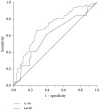Cut-off value for interleukin-34 as an additional potential inflammatory biomarker for estimation of slow coronary flow risk
- PMID: 38166811
- PMCID: PMC10762812
- DOI: 10.1186/s12872-023-03677-y
Cut-off value for interleukin-34 as an additional potential inflammatory biomarker for estimation of slow coronary flow risk
Abstract
Background: Inflammatory markers may provide insights into the underlying mechanisms of slow coronary flow (SCF), including subclinical atherosclerosis and endothelial dysfunction. Interleukin-34 (IL-34), known for its role in immuno-inflammatory diseases, might hold significance in SCF. We aimed to explore the potential association between IL-34 and SCF in patients undergoing diagnostic elective coronary angiography.
Methods: This observational, cross-sectional study enrolled 256 participants: 124 with SCF and 132 with normal coronary flow (NCF). All participants had undergone outpatient coronary angiography for suspected coronary artery disease. SCF assessment employed the TIMI frame count (TFC) for quantifying coronary flow rate.
Results: SCF patients exhibited significantly elevated TFC in all three major coronary arteries compared to controls (p < 0.05). IL-34 displayed a noteworthy positive correlation with average TFC [for all participants: r = 0.514, p < 0.001; for SCF patients: r = 0.526, p < 0.001; for normal controls: r = -0.288, p > 0.05]. Similarly, high-sensitivity C-reactive protein (hsCRP) showed a significant and positive relationship with average TFC [for all participants: r = 0.504, p < 0.001; for SCF patients: r = 0.558, p < 0.001; for normal controls: r = -0.148, p > 0.05]. SCF patients presented coronary arteries of larger size compared to controls.
Conclusion: Mean coronary diameter and IL-34 emerged as independent predictors of SCF. Additionally, hsCRP, mean coronary diameter, and IL-34 exhibited a positive correlation with mean TFC values. IL-34 appears to be a more effective indicator than hsCRP in SCF patients.
Keywords: IL-34; Slow coronary flow (SCF); hsCRP.
© 2023. The Author(s).
Conflict of interest statement
None.
The authors declare no competing interests.
Figures
Similar articles
-
Increased plasma high-sensitivity C-reactive protein and myeloperoxidase levels may predict ischemia during myocardial perfusion imaging in slow coronary flow.Arch Med Res. 2014 Jan;45(1):63-9. doi: 10.1016/j.arcmed.2013.10.019. Epub 2013 Dec 6. Arch Med Res. 2014. PMID: 24316393
-
Assessment of risk factors and left ventricular function in patients with slow coronary flow.Heart Vessels. 2016 Mar;31(3):288-97. doi: 10.1007/s00380-014-0606-4. Epub 2014 Dec 5. Heart Vessels. 2016. PMID: 25475386
-
Interleukin-10 promotor -592A/C polymorphism is associated with slow coronary flow in Han Chinese.Int J Clin Exp Pathol. 2015 Apr 1;8(4):4091-8. eCollection 2015. Int J Clin Exp Pathol. 2015. PMID: 26097597 Free PMC article.
-
Peripheral hemorheological and vascular correlates of coronary blood flow.Clin Hemorheol Microcirc. 2011;49(1-4):261-9. doi: 10.3233/CH-2011-1476. Clin Hemorheol Microcirc. 2011. PMID: 22214697 Review.
-
The role of urotensin II and atherosclerotic risk factors in patients with slow coronary flow.Interv Med Appl Sci. 2016 Dec;8(4):158-163. doi: 10.1556/1646.8.2016.4.1. Interv Med Appl Sci. 2016. PMID: 28180005 Free PMC article. Review.
Cited by
-
Association Between Inflammation Indices Derived From Complete Blood Count and Coronary Artery Calcification.J Inflamm Res. 2025 Mar 13;18:3807-3816. doi: 10.2147/JIR.S501429. eCollection 2025. J Inflamm Res. 2025. PMID: 40103804 Free PMC article.
-
Emerging Predictors by Non-HDL-C/HDL-C Ratio and Novel Biomarkers for Coronary Slow Flow Phenomenon.Acta Cardiol Sin. 2024 Jul;40(4):367-372. doi: 10.6515/ACS.202407_40(4).20240624A. Acta Cardiol Sin. 2024. PMID: 39045366 Free PMC article. Review.
-
Association Between Systemic Inflammation Response Index and Slow Coronary Flow Phenomenon in Patients with Ischemia and No Obstructive Coronary Arteries.Int J Gen Med. 2024 Sep 13;17:4045-4053. doi: 10.2147/IJGM.S481538. eCollection 2024. Int J Gen Med. 2024. PMID: 39290232 Free PMC article.
-
Inflammation mediated glycolipid dysregulation in coronary microvascular disease pathogenesis.Sci Rep. 2025 Jul 2;15(1):22694. doi: 10.1038/s41598-025-08057-4. Sci Rep. 2025. PMID: 40594716 Free PMC article.
-
Neutrophil Percentage to Albumin Ratio as a Predictor for Coronary Slow Flow Phenomenon in Patients with Myocardial Ischemia with No Obstructive Coronary Arteries.Int J Gen Med. 2024 Aug 14;17:3511-3519. doi: 10.2147/IJGM.S477431. eCollection 2024. Int J Gen Med. 2024. PMID: 39161405 Free PMC article.
References
Publication types
MeSH terms
Substances
LinkOut - more resources
Full Text Sources
Molecular Biology Databases
Research Materials



